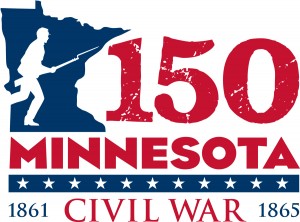Minnesota Civil War Commemoration Task Force
(www.mncivilwar150.com and “Minnesota Civil War 150” on Facebook)
Major Highlights for the Week
Wednesday November 5, 1862
After months of pressure from all sides, President Abraham Lincoln finally reached the end of his patience with Major General George B. McClellan, commander of the Army of the Potomac. After a slow campaign in the Peninsula, the failure to complete a partial victory at Antietam, followed by a snail-like advance in the weeks that followed, brought an end to the career of the general known as “Little Mac.” Though Lincoln made his decision, McClellan did not receive notice for two more days. It was also the end for Major General Fitz John Porter, a pro-McClellan corps commander who was charged with willful disobedience at Second Manassas. Porter was replaced immediately by Major General Joseph Hooker.
Thursday November 6, 1862
Changes were also being made in the Confederate Army of Northern Virginia. Among the promotions were James Longstreet and Thomas Jonathan Jackson, who were promoted from major general to lieutenant general and to command of the First and Second Army Corps, respectively.
Skirmishing occurred at Martinsburg, Virginia; Garrettsburg, Kentucky and Old Lamar, Mississippi.
Friday November 7, 1862
At 11:30 p.m., an office from Washington appeared at McClellan’s Rectortown, Virginia headquarters with the Nov. 5 orders removing him of command and turning control of the Army of the Potomac over to Major General Ambrose Burnside. The new commander had no desire for the command and had turned it down twice before, after the Peninsula Campaign and Second Bull Run.
Increased fighting occurred at Gallatin, Tyree Springs and White Range, Tennessee; as well as at Boonesborough, Rhea’s Mills and Marianna, Arkansas; Clark’s Mill, Missouri and Spaulding’s River, Georgia.
Saturday November 8, 1862
The Federal Army of the Potomac, concentrated in the area of Warrenton, Virginia, was rocked by news of McClellan’s dismissal.
In Tennessee, Major General Ulysses Grant continued reconnaissance from La Grange, with some skirmishing extending to Hudsonville, Mississippi. Action also occurred on the Cumberland River near Gallatin, Tennessee; Burkesville, Kentucky; Marianna, La Grange and Cove Creek, Arkansas.
In another command change, Major General Nathaniel P. Banks was named to command of the Federal Department of the Gulf, replacing Major General Benjamin Butler, whose dictatorial rule of New Orleans had brought charges and countercharges of cruelty, speculation and dishonesty. The same day that Butler was removed, he closed down all the breweries and distilleries within the department.
Sunday November 9, 1862
Major General Ambrose Burnside assumed full command of the Army of the Potomac at Warrenton, Virginia. Federal cavalry under Colonel Ulric Dahlgren made a sensational dash into Fredericksburg, Virginia.
Action occurred at Huntsville and Dry Wood, Missouri; in the Boston Mountains between Fayetteville and Cane Hill, Arkansas; and at Silver Springs and Lebanon, Tennessee.
Monday November 10, 1862
Major General George B. McClellan took an emotional, spectacular “farewell” of the Army of the Potomac. The idolization of “Little Mac” by the soldiers continued despite his defeats and failures in battle. The feelings of the army presented a problem to its new commander, Major General Ambrose Burnside. Major General Joseph Hooker formally took over command of the Fifth Corps from Major General Fitz John Porter, who was also relieved of duty.
President Abraham Lincoln requested the records on the convictions of the 303 Dakota Sioux Indians that were condemned to death for the U.S.-Dakota War in Minnesota.
Tuesday November 11, 1862
It was a day of lessened activity except for a Confederate demonstration at New Berne, North Carolina, and a skirmish at Jefferson, Virginia.
Where Minnesota Regiments were the week of November 5-11, 1862
1st Minnesota Volunteer Infantry – Marched up Loudon Valley to Falmouth, Virginia.
2nd Minnesota Volunteer Infantry – Guarded tunnel at Mitchellsville, Kentucky.
3rd Minnesota Volunteer Infantry – On duty at Fort Snelling, Minnesota.
4th Minnesota Volunteer Infantry – On reconnaissance duty at LaGrange, Tennessee.
5th Minnesota Volunteer Infantry – Companies B, C and D remained in Minnesota and Dakota Territory on garrison duty. Company B escorted the captured Indians from the U.S.-Dakota War to Fort Snelling. The remaining companies were on Major General Ulysses Grant’s Central Mississippi Campaign.
6th Minnesota Volunteer Infantry – On garrison duty at Fort Snelling, Glencoe, Forest City and Kingston until February 1863.
7th Minnesota Volunteer Infantry – On garrison duty in Mankato and other points in Minnesota until June 1863.
8th Minnesota Volunteer Infantry – On frontier duty at various points in Minnesota: Anoka, Princeton, Monticello, Kingston, Manannah, Paynesville, Fort Ripley, Sauk Center, Pomme de Terre, Alexandria and Fort Abercrombie until May 1864.
9th Minnesota Volunteer Infantry – On garrison duty in various frontier Minnesota communities until June 1863.
10th Minnesota Volunteer Infantry – Regiment on detached service for garrison duty at various outposts in frontier Minnesota until June 1863.
1st Regiment Minnesota Cavalry “Mounted Rangers” – Organized at St. Cloud, St. Peter and Fort Snelling for frontier duty against Indians until June 1863.
Brackett’s Battalion of Minnesota Cavalry – On scout duty towards Eddyville, Kentucky.
1st Minnesota Light Artillery Battery – On Major General Ulysses Grant’s Central Mississippi Campaign..
2nd Independent Battery, Minnesota Light Artillery – On duty at Nashville, Tennessee.
2nd United States Sharpshooters, Company A – On the march to Falmouth, Virginia.


